口语教案4
小学语文部编版一年级上册第一单元口语交际“我说你做”教案四篇际
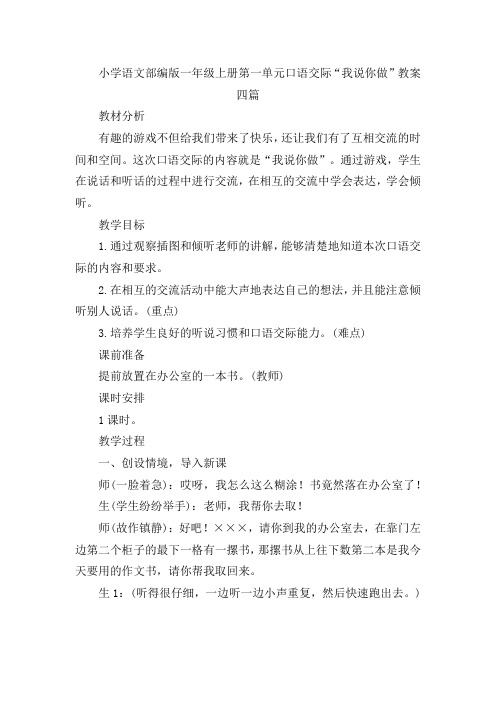
小学语文部编版一年级上册第一单元口语交际“我说你做”教案四篇教材分析有趣的游戏不但给我们带来了快乐,还让我们有了互相交流的时间和空间。
这次口语交际的内容就是“我说你做”。
通过游戏,学生在说话和听话的过程中进行交流,在相互的交流中学会表达,学会倾听。
教学目标1.通过观察插图和倾听老师的讲解,能够清楚地知道本次口语交际的内容和要求。
2.在相互的交流活动中能大声地表达自己的想法,并且能注意倾听别人说话。
(重点)3.培养学生良好的听说习惯和口语交际能力。
(难点)课前准备提前放置在办公室的一本书。
(教师)课时安排1课时。
教学过程一、创设情境,导入新课师(一脸着急):哎呀,我怎么这么糊涂!书竟然落在办公室了!生(学生纷纷举手):老师,我帮你去取!师(故作镇静):好吧!×××,请你到我的办公室去,在靠门左边第二个柜子的最下一格有一摞书,那摞书从上往下数第二本是我今天要用的作文书,请你帮我取回来。
生1:(听得很仔细,一边听一边小声重复,然后快速跑出去。
)师(故作轻松):这下好了!请大家把学习用品准备好!语文书放在书桌的左上角,练习本放在语文书上,从文具袋里拿出铅笔和橡皮,放在练习本上。
(生照着老师的要求做,几个同学没有按照老师的要求去做。
) 生1:老师,您的作文书取回来啦!(回到座位上坐好)师(看看作文书,点点头,故作惊讶):他怎么找得又准又快?生2(抢着回答):因为老师告诉他作文书在哪儿了,他照着做的。
师:如果让你去取作文书,你能这么快就找到吗?生2(低着头,挠挠脑袋):不能,老师您当时说的话太多,太长了,我根本没记住。
师(望向×××):那你是怎么做到的呢?生1:老师,您虽然话说得多,但是说得很清楚,我都听见了!我把您的话都记在心里,到了办公室照着做就找到了。
师:看来,要想把别人交代你的事情做好,认真听清楚要求很重要,同时要想让别人听清楚,说话的人应该大声说,清楚地说,让别人听清、听懂。
《口语交际:制定班级公约》教案4

五年级上册语文教案-口语交际:制定班级公约人教部编版创新教案制定班级公约教学目标:1.知道集体处处有规则,懂得规则可以使世界变得文明有序的道理,领会遵守规则的重要性。
2.了解作为小学生、小公民在日常的学习与生活中必须遵守规章制度。
3.制定班级公约,能自觉遵守规章制度,提高自我约束能力,做个讲文明、有教养的人。
教学重点:清楚明了地表达自己的观点,认真听取别人的观点。
教学难点:引导学生发挥主动性制定班级公约,营造良好的学习环境,并培养学生的班集体意识。
教学过程:一、游戏导入请一位同学扮演行人在路上行走。
他出现了以下这些情况:1.闯红灯2.不靠右行走3.在路上随意跳来跳去等师:请同学们说一说他这样做的危害。
生各抒己见,发表自己的看法师总结:规则很重要,我们要遵守规则。
(板书设计:规则)二、寻找生活中的规则。
师:其实,规则就在我们身边,下面请大家看一看,每个地方都有规则。
生讨论,并发言。
三、制定班级公约师:我们明白了规则的重要性,那么下面就为我们班制定一下班级规则——制定班级公约。
我们要从以下几个方面制定公约:1.从班级的学习、卫生、纪律方面制定。
2.从你发现的我们班里不文明的现象方面进行制定。
3.制定的公约要合理、科学、全面,要考虑到大多数人的情况。
分组制定班级公约。
要求:四人小组合作讨论,选择其中一个方面,针对班级情况,制定2条你认为最重要的班级公约,并写在纸上。
1.小组讨论、制定。
2.反馈。
(交流时,针对一条公约让学生提意见、修改,遵循少数服从多数的原则。
)小结:看来制定规则并不是一件简单的事情,它必须合理、科学,能够得到大多数人的认可。
老师建议下节品德课继续来讨论、修改这份班级公约,最后打印成文,使它成为我们班人人都必须遵守的规则。
相信有了这份公约的约束,我们班的同学会越来越有教养,而我们的集体也会更加文明、更加团结!六年级上册语文教案-快乐读书吧:笑与泪,经历与成长(教案)-人教部编版笑与泪,经历与成长【教学目标】1.鼓励学生阅读成长故事,从而进一步提高课外阅读的兴趣,养成良好的阅读习惯。
小学语文部编版一年级上册第四单元《口语交际 我们做朋友》教案四篇
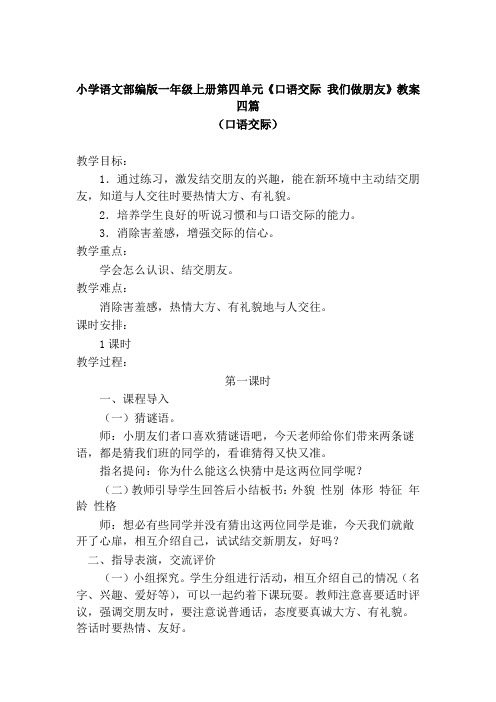
小学语文部编版一年级上册第四单元《口语交际我们做朋友》教案四篇(口语交际)教学目标:1.通过练习,激发结交朋友的兴趣,能在新环境中主动结交朋友,知道与人交往时要热情大方、有礼貌。
2.培养学生良好的听说习惯和与口语交际的能力。
3.消除害羞感,增强交际的信心。
教学重点:学会怎么认识、结交朋友。
教学难点:消除害羞感,热情大方、有礼貌地与人交往。
课时安排:1课时教学过程:第一课时一、课程导入(一)猜谜语。
师:小朋友们者口喜欢猜谜语吧,今天老师给你们带来两条谜语,都是猜我们班的同学的,看谁猜得又快又准。
指名提问:你为什么能这么快猜中是这两位同学呢?(二)教师引导学生回答后小结板书:外貌性别体形特征年龄性格师:想必有些同学并没有猜出这两位同学是谁,今天我们就敞开了心扉,相互介绍自己,试试结交新朋友,好吗?二、指导表演,交流评价(一)小组探究。
学生分组进行活动,相互介绍自己的情况(名字、兴趣、爱好等),可以一起约着下课玩耍。
教师注意喜要适时评议,强调交朋友时,要注意说普通话,态度要真诚大方、有礼貌。
答话时要热情、友好。
(二)分组汇报,做出评价。
选几位学生上台描述一下和自己有过交流的搭档(长相、兴趣、年龄等等)。
全体参与进行平价。
评价时,教师引导学生准确中肯地评价,善于去发现别人的长处。
三、创设交际情境,指导实践(一)让学生到座位上去结识自己想认识的同学,或者创设在校园里认识其他班级同学的情境。
(二)教师引导学生将之运用到现实生活中,如家里来了小客人,和小客人如何交朋友呢?四、拓展练习引导学生在生活中多去结交朋友,如小区里的小朋友等,随时汇报情况。
五、口语变际范文(操场上有三个小朋友在拍皮球,有两个小女孩想加入)丫丫:拍皮球真好玩,可惜我们没有!奇奇:这好办,我们可以和他们一起玩啊!(奇奇指着那三个小朋友)丫丫:可是我们不认识他们呢!奇奇:没关系,我们可以和他们交朋友啊!走!(丫丫和奇奇走到三个拍皮球的小朋友那儿)奇奇:你们好,我是- (2)班的奇奇。
口语交际教案(优秀6篇)
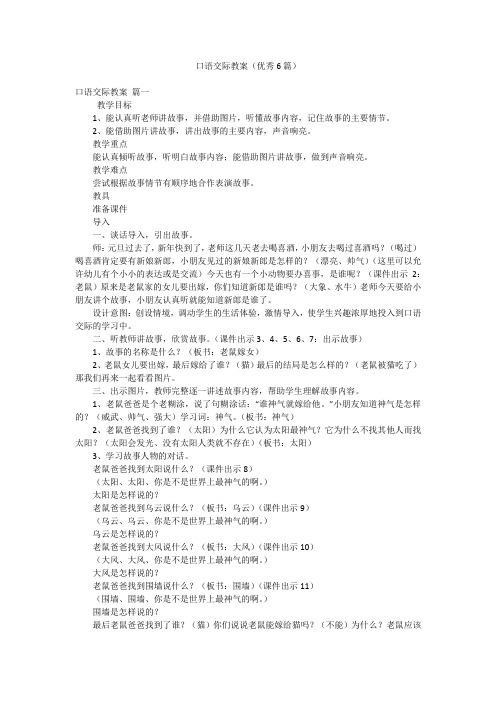
口语交际教案(优秀6篇)口语交际教案篇一教学目标1、能认真听老师讲故事,并借助图片,听懂故事内容,记住故事的主要情节。
2、能借助图片讲故事,讲出故事的主要内容,声音响亮。
教学重点能认真倾听故事,听明白故事内容;能借助图片讲故事,做到声音响亮。
教学难点尝试根据故事情节有顺序地合作表演故事。
教具准备课件导入一、谈话导入,引出故事。
师:元旦过去了,新年快到了,老师这几天老去喝喜酒,小朋友去喝过喜酒吗?(喝过)喝喜酒肯定要有新娘新郎,小朋友见过的新娘新郎是怎样的?(漂亮、帅气)(这里可以允许幼儿有个小小的表达或是交流)今天也有一个小动物要办喜事,是谁呢?(课件出示2:老鼠)原来是老鼠家的女儿要出嫁,你们知道新郎是谁吗?(大象、水牛)老师今天要给小朋友讲个故事,小朋友认真听就能知道新郎是谁了。
设计意图:创设情境,调动学生的生活体验,激情导入,使学生兴趣浓厚地投入到口语交际的学习中。
二、听教师讲故事,欣赏故事。
(课件出示3、4、5、6、7:出示故事)1、故事的名称是什么?(板书:老鼠嫁女)2、老鼠女儿要出嫁,最后嫁给了谁?(猫)最后的结局是怎么样的?(老鼠被猫吃了)那我们再来一起看看图片。
三、出示图片,教师完整逐一讲述故事内容,帮助学生理解故事内容。
1、老鼠爸爸是个老糊涂,说了句糊涂话:“谁神气就嫁给他。
”小朋友知道神气是怎样的?(威武、帅气、强大)学习词:神气。
(板书:神气)2、老鼠爸爸找到了谁?(太阳)为什么它认为太阳最神气?它为什么不找其他人而找太阳?(太阳会发光、没有太阳人类就不存在)(板书:太阳)3、学习故事人物的对话。
老鼠爸爸找到太阳说什么?(课件出示8)(太阳、太阳、你是不是世界上最神气的啊。
)太阳是怎样说的?老鼠爸爸找到乌云说什么?(板书:乌云)(课件出示9)(乌云、乌云、你是不是世界上最神气的啊。
)乌云是怎样说的?老鼠爸爸找到大风说什么?(板书:大风)(课件出示10)(大风、大风、你是不是世界上最神气的啊。
幼儿教师口语教案第4章讲述训练

单元/章节名称第四章讲述训练学时 4 学期总课次授课时间第周,星期,第节学习目标1.掌握复述、描述和评述的基本技能。
2.灵活运用复述、描述和评述进行讲故事的综合训练。
教学重点及解决措施综合运用运用复述、描述和评述进行讲故事。
做好复述、描述和评述训练的单项训练,并分析成功的讲故事的案例,让学生充分认识到复述、描述和评述在讲故事中的应用。
教学难点及解决措施综合运用运用复述、描述和评述进行讲故事。
在分别进行复述、描述和评述训练的基础上,让学生进行充分地练习。
教学反思授课内容及教学活动设计附注(教学方法、活动形式、辅助手段等)课前五分钟热身新授案例导入和分析第一节复述训练一、复述的定义及其要求复述是一种常用的口语表达形式。
它是指运用自己的语言,把看到或听到的语言材料重新叙述一遍,但是不能一成不变地照搬原文。
复述时,要在记忆和理解的基础上,对读过的或听过的语言材料进行加工整理,根据不同的要求,或周密详细地叙述,或简要概括地叙述,或变换人称来叙述,或变换顺序来叙述,甚至可略加想象,丰富一些细节内容来叙述。
复述的基本要求有以下几点:(1)忠于原材料的内容或要点。
(2)完整准确地体现原材料的中心和重点。
(3)条理清楚,能反映各部分内容的内在联系。
(4)要口语化,尤其要将书面句式、词语转化为口语。
二、复述的分类及训练复述虽是对原材料的重新叙述,但不是一种简单的重复,而是在忠实于原材料的基础上的再加工与再创造。
因而复述的种类有很多,常见的复述有详细复述、扩展复述、概要复述和变式复述。
(一)详细复述详细复述又称一般性复述,这是最简单、最基本、最接近原材料的复述。
教师讲解,与学生互动第 1 页授课内容及教学活动设计附注(教学方法、活动形式、辅助手段等)具体来讲就是按照原材料的内容、结构、顺序,把事情原原本本地叙述出来。
它并非是对原材料的背诵,它的技巧体现在复述者语言的组织和加工上。
在进行详细复述时,要注意以下四点:(1)围绕文章中心,不改变原意。
英语口语4 教案(1-6)

IntroductionA Brief Introduction of This Course◆It is a colloquial way to practice their oral English.◆What they have got before: Concentrate on the study of speech, which includesboth the practice of all aspects of speech and the introduction of speech knowledge and skills, like delivering speeches on various occasions, such as highly practical welcome, awards, thanks, etc.◆What they want to get this term: their needs; suggestions and plan.◆What I would like to explain: why debate; how to think when debating; how toopen a speech; how to deal with the opponent’s examples; how to arrange a debate;how to avoid personal attacks; the tips for debate; the comments on their performance, etc.◆The time table for this term: 16 weeksDebateGroup workDiscussion report and homework reportThe Request to the Students:◆ to be active◆ Participate in the activities◆ Well-prepared after class◆ Give me suggestionsUnit 1 EducationI. Warming-upDiscuss on the following topics:1. Free Pass Fails Kids2. Learning for Life---Wherever You Are3. Learner AutonomyII. Reading and Discussion1. Explain the new words and expressions to studentsSequential: adj. Following in order of time or placee.g. sequential data processingGovernor: n. head of a state in the United Statese.g. He was confirmed as the provincial governor for another five-year term. Abolish: v. to officially end a law, a system or an institutione.g. This tax should be abolishedMediocrity: n. the fact of being average or not very goode.g. His acting career started brilliantly, then sank into mediocrity.Absolve: v. to state formally that somebody is not guilty or responsible for something e.g. The court absolved him of all responsibility for the accidentBalloon: v. to increase rapidlye.g. Unemployment ballooned to fourteen percentCustomized: adj. Made or changed suit the needs of the owner or usere.g. A customized carCheckpoint: n. a place, especially on a border between two countries, where people have to stop so their vehicles and documents can be checkede.g. There are border guards at the checkpoint crossing.Competence: n. the ability to do something welle.g. To gain a high level of competence in English2. Read the whole passage at the normal speed.3. Ask some comprehension questions and let students answer orally.●What is meant by the phrase “social promotions”?●What is the author’s attitude toward “free pass”?●Are there any major problems with the “retention system”? What are they?4. Ask students to read it again and summarize the main points.III. Follow-up TasksTask I: Finding Your Classmate’s Opinion on Free PassTime Limit: 15 minutesActivity Type: Group workProcedures:●Divide the class into groups of 4-6●Work as a team to design interview questions●Conduct an inter-group interview and try to get as much as possible yourclassmate’s opinion about free pass. You may take notes.●After the interview is over, go back to your group, and report to group memberswhat the interviewee thought of the issue, using reported speech styleTask II: Solving the ProblemTime Limit: 20 minutesActivity Type: Group workProcedures:●Divide the class into groups of 4-6●Locate as many as possible of the currently existing and potential problems in theeducation system. Some of these are:Students’ lack of learning motivationToo many examinationsToo much pencil work and memory workLittle relevance to future careersUninteresting content of learningUnhealthy competitionFees to highCheating in the examinations●Search for the causes of the problems●Work out feasible solutions to some of the problems, give a rationale for yourfindings, and invite disagreement from other group members.●Select a student as a representative and report his/her group’s discussion to thewhole class.IV. Practice (Act it out)Divide the whole class into groups of 4-5 students, ask each group to talk on one of the following suggested topics and choose one speaker for the presentation. Suggested topics:●Examinations for university students should be abolished●All-round ability training is more important than professional ability training●Schools teach less than society does●University education must take practicality as its major aim●Students learn less with too much homeworkV. HomeworkAre you familiar with the working principles of the market economy, especially those in the field of world trade? Do you agree that buying domestic products represents patriotism? If you are not sure about your answers to these questions, please read something on the world economy and get ready for Unit 2.Unit 2 Global EconomyI. Warming-upDiscuss on the following topics:1. Globalization in Retreat2. Is the World Ready for New International Financial System?3. Supply-ChainingII. Reading and Discussion1. Explain the new words and expressions to studentsAdvent: n. the coming of an important event, person, invention, etc.e.g. the advent of new technologyDisdainfully: adv. Without respect; in a disdainful mannere.g. some are dozing and some are looking disdainfully at me.Outsourcing: n. the process of arranging for somebody outside a company to do work or provide goods for that companye.g. The outsourcing of IT work to private contractorsInterventionist: adj. favoring intervention, especially by a government in its domestic economy or by one state in the affairs of anothere.g. Roosevelt’s interventionist policiesProsperity: n. the state of being successful, especially in making moneye.g. Our future prosperity depends on economic growth.Insulate: v. to protect somebody/something from unpleasant experiences or influences e.g. Until now the industry has been insulated from economic realities.Engulf: v. to surround or to cover somebody/something completelye.g. He was engulfed by a crowd of reporters.Defunct: adj. No longer existing, operating or being usede.g. A largely defunct railway networkPrecipitate:v. to make something, especially something bad, happen suddenly orsooner than it shoulde.g. His resignation precipitated a leadership crisis.Debacle: n. an event or a situation that is a complete failure and causes people to feel ashamed or embarrassede.g. He should take responsibility for the debacle and resignStagnation: n. the fact of no longer developing or making progresse.g. A period of economic stagnationMultilateralism n. a situation in which several different countries or organizations work together to achieve something or deal with a probleme.g. The report’s conclusion stresses the importance of multilateralism.Acrimony: n. angry bitter feelings or wordse.g. The dispute was settled without acrimony.2. Read the whole passage at the normal speed.3. Ask some comprehension questions and let students answer orally.●Do you think that globalization is a complete failure?●What, according to this reading, are the reasons for the retreat of globalization?●How much do you know about the WTO, the World Bank or the IMF?●Why is McDonald’s regarded as “the basis of one of the most influentialdevelopments in contemporary society” (Paragraph 1, Reading B)?III. Follow-up TasksTask I: Product Promotion Gala: Nong Fu Mineral Water, Coca-Cola, Kang Shi Fu Green TE, Wang Lao Ji, Meng Niu Yoghurt, and Nestle Coffee.Time Limit: 30 minutesActivity Type: Group workProcedures:●Divide the class into groups of 4-6●Each group chooses one product from the above list as their promotion product ●Discuss within the group Promotional strategies.●Present the product promotion to the rest of the class●Based on your classmates’ promotional presentations, each student votes for hisfavorite product. Note that you can not vote for the product of your own group. Task II: Starting up Your Own BusinessProcedures:●Divide the class into groups of 4-6●Each group chooses one particular item for your business, either goods or service ●Within each group, allocate the following roles among group membersOne or two designing staffOne or two sales staffOne business executiveOne representative of the board of directors●The groups work out the business blueprint, including product descriptions, marketinvestigation, producing details, advertising and promotion strategies and schedules etc.●The representative of the board of directors pronounces to the rest of the class yourbusiness blueprint.IV. Practice (Act it out)Divide the whole class into groups of 4-5 students, ask each group to talk on one of the following suggested topics and choose one speaker for the presentation. Suggested topics:●The government should levy higher tax on high-profit enterprises●The levying of inheritance tax on the legatee is unfair●The spread of global supply chains in the world helps to reduce the war risk ascountries that are part of a major supply chain will be unwilling to fight a war against each otherV. HomeworkPreview Unit 3, and prepare a speech arguing for/against the proposition “To achieve harmonious personal relationships requires some degree of dishonesty”Unit 3 HonestyI. Warming-upDiscuss on the following topics:1. Better Left Unsaid2. Honesty vs. Lying3. Grandma’s BookII. Reading and Discussion1. Explain the new words and expressions to studentsZealous: adj. showing great energy and enthusiasm for something, especially because you feel strongly about ite.g. a zealous reformerFrailty: n. weakness and poor healthe.g. Increasing frailty meant that she was more and more confined to bed. Panacea: n.something that will solve all the problems of a particular situatione.g. There is no single panacea for the problem of unemployment.Distort: v. to change something so that it is false or wrong, or no longer means what it was intended to meane.g. She accused her opponent of distorting the truth.Continental Airlines:was a major United States airline founded in 1934 and headquartered in Houston, Texas.Bond: n. something that forms a connection between people or groups, such as a feeling of friendship or shared ideas and experiencese.g. A bond of friendship had been forged between them.Appreciate: v. to recognize the good qualities of somebody/somethinge.g. Over the years he came to appreciateIntegrity: n.the quality of being honest and having strong moral principlese.g. She behaved with absolute integrityManuscript: n. a copy of a book, piece of music, etc. before it has been printede.g. an unpublished /original manuscript2. Read the whole passage at the normal speed.3. Ask some comprehension questions and let students answer orally.●Sometimes telling the truth does help improve relationships.●What is the importance of promoting honesty in employees?●How can we strike a balance between company profit and customer benefit withoutsacrificing employees’ honesty?4. Ask students to read it again and summarize the main points.III. Follow-up TasksTask I: HypothesizingBased on the background information and further readings of this unit, discuss with your partner the following hypotheses and tell him/her what you would have done under these hypothetical situations.Hypothesis 1 : if you were the mother, would you tell your son that he had been an accident?Hypothesis 2 : if you were John, would you go through so many troubles just to hide the truth?Task II: Dilemmas -What Would You Do?●When you are told by the doctor that your beloved one is suffering from cancer….●When you are asked by a lady whether her dress is smart and you don’t really thinkso….●When your friend has bought you something you don’t really like…..Time Limit: 20minutesActivity Type: Group workProcedures:●Divide the class into groups of 4-6●Each group chooses one dilemma●Discuss within the group your solution to the dilemma.●Choose one as the group representative and report to the class your group’s decisionand explain the reason.IV. Practice (Act it out)Divide the whole class into groups of 4-5 students, ask each group to talk on one of the following suggested topics and choose one speaker for the presentation. Suggested topics:●Who is to define truth? And from whom?●Is there truth in existence for all the people or does it only exist for the individual?●Which expression is more accurate in helping people perceive truth, “ the bodyseeks truth” or “ the body misleads”?●Should good feelings be valued more than truth itself?V. HomeworkPreview Unit 4, and prepare a speech arguing for/against the proposition “It is better for women to stay home and bring up children than to work in society”.Unit 4 Job HuntingI. Warming-upDiscuss on the following topics:1. How to Shine at a Job Interview2. Making a Job Advertisement3. Job HuntingII. Reading and Discussion1. Explain the new words and expressions to studentspound: v. strike or hit heavily and repeatedlye.g. Patrick pounded the couch with his fists.accommodate: v. fit in with the wishes or needs ofe.g. Any language must accommodate new concepts.abject: adj. (of a situation or condition) extremely bad, unpleasant, and degradinge.g. Many people are living in abject poverty.get nowhere: do not get any progresse.g. Direction means objectives. You can get nowhere without an objective in life. hostile: adj. openly opposed or resistinge.g. hostile to new ideasingratiate: v. gain favor with somebody by deliberate effortse.g. The first part of his plan was to ingratiate himself with the members of the committee.encounter: n. a meeting, especially one that is sudden, unexpected or violente.g. The story describes the extraordinary encounter between a man and a dolphin. phony: adj.fraudulent; having a misleading appearancee.g. He'd telephoned with some phony excuse she didn't believe for a minute. transact: v. to do business with a person or an organizatione.g. At last the agency told me it would take a week time to transact procedures.resent: v. to feel bitter or angry about sth, especially because you feel it is unfaire.g. They only feel angry about their ill treatment and resent whoever tries to help.2. Read the whole passage at the normal speed.3. Ask some comprehension questions and let students answer orally.●What is the aim of a job interview?●Is it very important to please the interviewer?●Can the interview be controlled by anyone?●What are the effective ways of making an impression on the interviewer?●Do you agree with the author or not and why?●Add some other myths about job interviews if any,and support your ideas with moredetails.4. Ask students to read it again and summarize the main points.III. Follow-up TasksTask I: Designing Job AdvertisementsTime Limit: 20 minutesActivity Type: Group workProcedures:●Divide the class into groups of 3-4.●Work as a team to design job advertisements.●Check the content, style and language of your advertisements. You may read“Making a Job Advertisement “in Further Reading for reference.Task II: Creative ActivitiesTime Limit: 20 minutesActivity Type: Group workProcedures:●Hand in the job advertisements you designed.●Divide the class into two: one half for employers, and the other half for jobapplicants.●The employers are further divided into groups of 2 to form a company; eachcompany selects a job advertisement, and then pins it up on the blackboard. Atthe same time, job applicants fill out the Employment Application Form(Appendix I).●The employers work as a team to decide the questions for the interview. At thesame time, each job applicant looks at the job advertisements, chooses acompany, and modifies his/her application form.●The job applicant hands in the completed application form to the chosencompany to start the interview. Each of the employers should ask theinterviewee questions, and keep a record of the applicant data with the help ofthe Assessment Form (Appendix II).IV. Practice (Act it out)Divide the whole class into groups of 3-4 students, ask each group to talk on one of the following suggested topics and choose one speaker for the presentation. Suggested topics:●People should be promoted for strong professional ability rather than for degrees.●Constant job-hopping is beneficial to both the individual and the enterprises.●Manual laborers must be paid more than office workers.●There should be no mandatory retirement age.●Unemployment is an inevitable result of social development.●People work to live, not live to work.●University students should not work part time to earn academic credits.●University education should guarantee students well-paid jobs.●There is good reason for sexual discrimination on the job market.●Love at work places hampers both parties’ work relationships.V. HomeworkPreview Unit 5, and prepare a speech arguing for/against the proposition “It is better for women to stay home and bring up children than to work in society.Unit 5 WomenI. Warming-upDiscuss on the following topics:1. Women at Work2. Remarks on Women Draw Fire3. Masako-The Japanese Crown PrincessII. Reading and Discussion1. Explain the new words and expressions to studentsmaintenance n. the act of keeping something in good condition by checking or repairing it regularlye.g. The school pays for heating and the maintenance of the buildings.free - lance:if you work free - lance, you work for yourself and do projects with different companies rather than being a company employee.e.g. After ten years in corporate advertising, he decided to go free - lance. cooperative: n.( business ) owned and run by the people involved , with the profits shared by theme.g. The magazine is run as a cooperative.uproar: n. a situation in which people shout and make a lot of noise because they are angry or upset about somethinge.g. Her comments provoked (an) uproar from the audience.elite: adj. considered the best or most powerful compared to others of a similar type e.g. Interest in elite high school math competitions has grown in recent years bureau: n. an office or organization that provides information on a particular subject e.g. She works for an employment bureau.attendee n. the person who attends a meetinge.g. conference attendeessynthesize: v. to combine separate ideas, beliefs, styles, etc.e.g. Students learn to synthesize information and search for what is relevant. scholarship:n.[ uncountable ] the serious study of an academic subject and the knowledge and methods involvede.g. a magnificent work of scholarship2. Read the whole passage at the normal speed.3. Ask some comprehension questions and let students answer orally.●Is building industry traditionally a male-dominant occupation in China? What isthe current situation?●Have you experienced sexual discrimination of any degree anywhere? Talk aboutit to your classmates if yes. Report someone else's experience if not.●What types of occupations generally discriminate against women, or men? Andwhich ones are more tolerant of both sexes?●What qualities should women possess to be competent in men's areas? And viceversa, for men?III. Follow-up TasksTask I: Jobs and Gender: Some jobs seem to be more suitable for men, while others seem to be female-dominant. The table below lists jobs more suitable for men and jobs more suitable for women.Time Limit: 10 minutesActivity Type: Pair workProcedures:●Complete the table by brainstorming with your partner.●Discuss with your partner why some jobs are more suitable for women and whysome others are more suitable for men.Task II: Reaction to Summers’ ResignationTime Limit: 10 minutesActivity Type: Pair workProcedures:●Divide the class into pairs.●Work in pairs to complete the following table by summarizing the opinions of thesetwo groups of people upon Summers’ comments on gender differences according to “Remarks on Women Draw Fire” in Further Reading.Side A: Nancy Hopkins et al.Side B: Richard Freeman et al.●Take a side, and make sure yours is in opposition to your partner's.●Prepare a short speech of your side in reaction to Summers’ resignation in the news.. IV. Practice (Act it out)Divide the whole class into groups of 4-6 students, ask each group to talk on one of the following suggested topics and choose one speaker for the presentation. Suggested topics:●Women enjoy equal status as men do in Chinese society.●Both men and women are born to be part of a unified whole.● A happy family does not necessarily ensure one a happy life.●Life is meaningless for a woman if she is only contented with her sweet family life.●When women claim the need to be taken care of, they are nothing but the weaker.●High divorce rate represents social progress.●The marriage permit for college students is meant to protect women and is evidenceof women as the weaker.●The call for equality between men and women betrays the truth of inequality.●It is more important for a girl to find a good husband than a good job.●Girls can be as smart as boys when it comes to intelligence.V. HomeworkPreview Unit 6, and prepare a speech arguing for/against the proposition “Juvenile delinquents would be better off in foster homes than in Work-and-Study Schools.”Unit 6 Discipline and PunishmentI. Warming-upDiscuss on the following topics:1. A Report to the Juvenile Court2. One Man’s Long March to Educate3. Capital Punishment is the Only Way to Deter CriminalsII. Reading and Discussion1. Explain the new words and expressions to studentsjuvenile: adj. relating to young people who are not yet adultse. g. What can be done to help these juvenile delinquents turn away from crime? justified: adj. having a good reason for somethinge. g. I accept that the criticism is completely justified.analytical: adj. using a logical method of thinking about something in order to understand it, especially by looking at all the parts separatelye. g. She has a clear analytical mind.aptitude: n. natural ability or skill at doing somethinge. g. She showed a natural aptitude for the work.harassment: n. the act of annoying or worrying somebody by putting pressure on them or saying or doing unpleasant things to theme. g. racial/sexual harassmentdetention: n. the act or condition of being officially forced to stay in a placee. g. They were sentenced to 12 months’ detention in a young offender institution. demeaning: adj. putting somebody in a position that does not give them the respect that they should havee. g. He found it demeaning to work for his former employee.ostracize: v. to refuse to let somebody be a member of a social groupe. g. He was ostracized by his colleagues for refusing to support the strike. instigator: n. a person who causes something to happen, especially something bade. g. the instigators of the riots2. Read the whole passage at the normal speed.3. Ask some comprehension questions and let students answer orally.●Tell your partner what kind of attention you, as a teenager, used to seek from yourmother and father respectively.●If possible, look back into your childhood for how your parents’ behavior ormisbehavior could have influenced your mentality or personality development.●What kinds of concern or attention would you give to your own children in thefuture?4. Ask students to read it again and summarize the main points.III. Follow-up TasksTask I: J udging the BehaviorsTime Limit:10 minutesActivity Type: Pair workAre the following behaviors constructive or destructive to children's physical, mental and intellectual development? Why or why not? What suggestions would you put forward to teachers or parents for their misconduct or unacceptable behavior?● A couple was known to have confined their little daughter to the house for fear thatshe might be hurt or cause trouble once she was out.● A junior middle school student was never allowed to have spare money on him.Whenever he was found to be given some money by his relatives, his mother would take it away from him against his will.●When children failed to answer a question correctly in the classroom, they weretold to remain standing throughout the class hour or copy the text for a hundred times.●The husband and wife are dissatisfied with one another and often quarrel overtrivial things in front of their children.Task II: Advice to the Spoiled SonTime Limit:10 minutesActivity Type: Pair workYou've just received a telephone call from your aunt complaining about her 14-year-old spoiled son. She is hesitating about whether to send her son to Mr. Xu Xiang yang’s Walking School, and seeks your opinion on this issue.Role A: You think that the Walking School is very good and can be effective.Role B: You dislike the Walking School and think that it goes to extremes. Procedures:●Work in pairs.●Divide Role A and Role B between your partner and yourself.●Try to persuade your partner of your stand through reasoning.IV. Practice (Act it out)●Work in pairs, and each takes the affirmative or negative side.●The first affirmative speaker delivers a 2-3 minute speech arguing for theproposition.●The first negative speaker delivers a 2-3 minute speech in response arguing againstthe proposition.●After the opening speech, the first speaker starts the free debate session. The timelimit for each speaking occasion is no more than 1.5 minutes.●Select one or two pairs to present their debate in class.Suggested topics:●Spare the rod, spoil the kid.●Smoking should be prohibited in public places.●Fast social development contributes to higher crime rate.●It is immoral to send aging parents to nursing homes.●Social welfare should be given more consideration than space programs.●Juvenile delinquents should receive legal punishment as adult criminals.●Poverty is a major cause of social crimes.●Capital punishment is inhumane.●The criminals need more emotional or psychological guidance than uselesspreaching.●Non-violent criminals should stay out of prison doing community service insteadof serving their terms in prison.V. HomeworkPreview Unit 7, and prepare a speech arguing for/against the proposition “It is more important to support the weak.”。
有关口语交际教案四篇

有关口语交际教案四篇口语交际教案篇1【口语交际】保护文物,既是爱国的表现,也是守法的行为。
对“世界遗产”,既要申报,又要宣传,更要保护。
安排这次口语交际,就是为了让学生在语文实践中提高文物保护意识,树立“保护文物,人人有责,从我做起,从小处做起”的观念。
教材中关于长城的报道,是为了引出口语交际的话题。
教师在教学时,可以运用多种方式引发学生交际的兴趣,如,让学生自读这段文字,或向学生展示破坏文物的图片实例。
本次口语交际的重点是商量怎样保护,提出保护的建议。
可以先分小组商议保护长城的建议,或就“如何做一个文明的游客”这一话题展开讨论,再推荐代表在全班交流,最后形成建议书或倡议书。
在讨论交流的过程中,要通过点拨、评议等方式引导学生把话说清楚、说具体,做到言之有序、言之有理,如,提建议时,要把意思相近的内容放在一起说。
如果当地有“世界遗产”,或是其他文物古迹,学生可以围绕当地文物保护的现状展开口语交际,而不必拘泥于保护长城的内容。
【习作】本次习作引导学生把课文中的语言和资料中的语言,转化为学生自己的实用的语言。
学生在这次习作活动中,可以继续体会“世界遗产”的魅力,感受中国的悠久历史和灿烂文化。
教材中明确提出了习作的内容、要求和步骤,教师可以引导学生自己读一读这段文字,然后让学生自选内容、自由表达、自主习作。
要提醒学生注意导游词的特点,如,写导游词要根据游人的需要确定重点,选取最有特色或最有价值的内容向大家介绍,不一定要面面俱到;还应根据口语交际讨论的成果,提示参观游览的注意事项,向旅游者提出“当文明游客”的要求。
在教学时,要把说和写充分结合起来,写好后可以安排模拟导游讲解,给学生创设表达的机会。
在讲评习作时,教师要鼓励表达有个性、有创意的同学。
如,图文搭配,表达形式丰富;引用或创编恰当的广告词,调动游客的兴趣;或把题目分为总题目“XXX导游词”和小题目“景点风光简介”“XX的传说”“请您注意”等。
【我的发现】这次“我的发现”,引导学生发现一种表达的方法:描写事物时,用大家熟知的事物作比照,就会使事物变得十分具体、形象,使读者很容易想象出所描写事物的特征。
4口语交际《介绍操作过程》教案(中职语文)

4口语交际《介绍操作过程》教案(中职语
文)
教学目标
- 了解并研究如何运用口语交际技巧介绍操作过程
- 增强学生的口语表达能力和沟通能力
- 培养学生的合作意识和团队合作能力
教学内容
1. 介绍操作过程的基本概念和要求
2. 研究常用的口头表达方式
3. 练介绍各种操作过程,如制作食物、组装物品等
教学步骤
1. 导入:通过观看一个操作过程的视频,引发学生对操作过程
介绍的兴趣
2. 讲解操作过程的基本概念和要求:通过举例和解释,让学生
理解操作过程介绍的重要性和技巧
3. 研究口头表达方式:介绍一些常用的表达方式,如时间顺序、步骤和动作描述等
4. 练口头表达:分组让学生自行选择一个操作过程进行练介绍,并互相评价优化表达方式
5. 教师点评和总结:对学生的表现进行点评,总结并强调关键
点和技巧
教学资源
- 操作过程的视频示例
- 介绍操作过程的教学PPT
- 练介绍操作过程的题目和材料
教学评估
- 根据学生在练中的表现,评估其口语表达能力和沟通能力的
提升程度
- 通过学生的评价和教师的点评,评估教学效果和研究收获
教学延伸
- 引导学生运用学到的口语交际技巧,参与其他实际操作过程
的介绍,如参观工厂、实验室等
- 帮助学生更好地应用操作过程介绍技巧,提高实际操作的效
率和准确性
参考资料
- 《中职语文教学指导大纲》
- 相关操作过程介绍的教学案例和实例。
英语口语课教案5篇
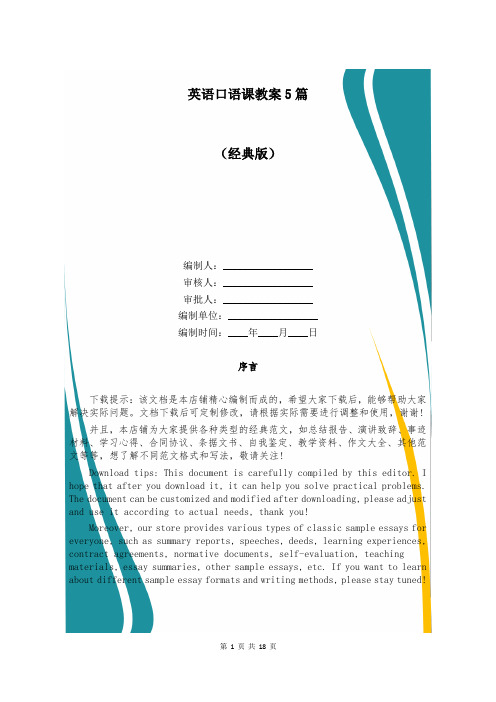
英语口语课教案5篇(经典版)编制人:__________________审核人:__________________审批人:__________________编制单位:__________________编制时间:____年____月____日序言下载提示:该文档是本店铺精心编制而成的,希望大家下载后,能够帮助大家解决实际问题。
文档下载后可定制修改,请根据实际需要进行调整和使用,谢谢!并且,本店铺为大家提供各种类型的经典范文,如总结报告、演讲致辞、事迹材料、学习心得、合同协议、条据文书、自我鉴定、教学资料、作文大全、其他范文等等,想了解不同范文格式和写法,敬请关注!Download tips: This document is carefully compiled by this editor. I hope that after you download it, it can help you solve practical problems. The document can be customized and modified after downloading, please adjust and use it according to actual needs, thank you!Moreover, our store provides various types of classic sample essays for everyone, such as summary reports, speeches, deeds, learning experiences, contract agreements, normative documents, self-evaluation, teaching materials, essay summaries, other sample essays, etc. If you want to learn about different sample essay formats and writing methods, please stay tuned!英语口语课教案5篇一份优质的教案能够帮助教师更好地调整教学节奏,确保学生的学习效果最大化,写好教案需要教师对教学反馈进行及时和有效的处理,以下是本店铺精心为您推荐的英语口语课教案5篇,供大家参考。
部编版语文五年级上册《口语交际:制定班级公约》公开课优秀教案4
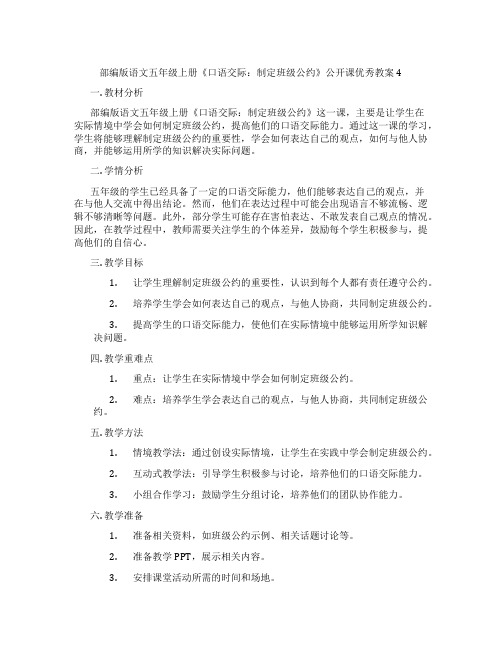
部编版语文五年级上册《口语交际:制定班级公约》公开课优秀教案4一. 教材分析部编版语文五年级上册《口语交际:制定班级公约》这一课,主要是让学生在实际情境中学会如何制定班级公约,提高他们的口语交际能力。
通过这一课的学习,学生将能够理解制定班级公约的重要性,学会如何表达自己的观点,如何与他人协商,并能够运用所学的知识解决实际问题。
二. 学情分析五年级的学生已经具备了一定的口语交际能力,他们能够表达自己的观点,并在与他人交流中得出结论。
然而,他们在表达过程中可能会出现语言不够流畅、逻辑不够清晰等问题。
此外,部分学生可能存在害怕表达、不敢发表自己观点的情况。
因此,在教学过程中,教师需要关注学生的个体差异,鼓励每个学生积极参与,提高他们的自信心。
三. 教学目标1.让学生理解制定班级公约的重要性,认识到每个人都有责任遵守公约。
2.培养学生学会如何表达自己的观点,与他人协商,共同制定班级公约。
3.提高学生的口语交际能力,使他们在实际情境中能够运用所学知识解决问题。
四. 教学重难点1.重点:让学生在实际情境中学会如何制定班级公约。
2.难点:培养学生学会表达自己的观点,与他人协商,共同制定班级公约。
五. 教学方法1.情境教学法:通过创设实际情境,让学生在实践中学会制定班级公约。
2.互动式教学法:引导学生积极参与讨论,培养他们的口语交际能力。
3.小组合作学习:鼓励学生分组讨论,培养他们的团队协作能力。
六. 教学准备1.准备相关资料,如班级公约示例、相关话题讨论等。
2.准备教学PPT,展示相关内容。
3.安排课堂活动所需的时间和场地。
七. 教学过程1.导入(5分钟)教师通过一个发生在班级里的实际问题,引发学生对班级公约的思考,导入新课。
示例:教室里的卫生情况一直不太理想,同学们纷纷提出自己的看法,但没有人能够解决这个问题。
教师引导学生思考:为什么会出现这种情况?我们应该如何解决?2.呈现(10分钟)教师展示一些班级公约的示例,让学生了解公约的内容和作用。
口语交际打电话教学设计4篇
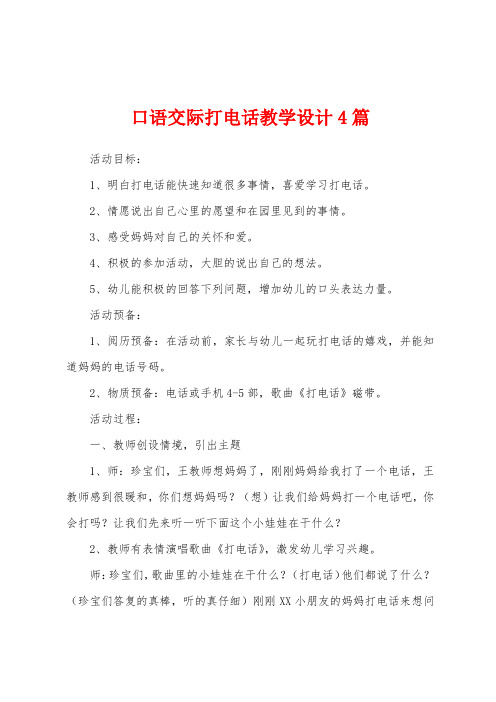
口语交际打电话教学设计4篇活动目标:1、明白打电话能快速知道很多事情,喜爱学习打电话。
2、情愿说出自己心里的愿望和在园里见到的事情。
3、感受妈妈对自己的关怀和爱。
4、积极的参加活动,大胆的说出自己的想法。
5、幼儿能积极的回答下列问题,增加幼儿的口头表达力量。
活动预备:1、阅历预备:在活动前,家长与幼儿一起玩打电话的嬉戏,并能知道妈妈的电话号码。
2、物质预备:电话或手机4-5部,歌曲《打电话》磁带。
活动过程:一、教师创设情境,引出主题1、师:珍宝们,王教师想妈妈了,刚刚妈妈给我打了一个电话,王教师感到很暖和,你们想妈妈吗?(想)让我们给妈妈打一个电话吧,你会打吗?让我们先来听一听下面这个小娃娃在干什么?2、教师有表情演唱歌曲《打电话》,激发幼儿学习兴趣。
师:珍宝们,歌曲里的小娃娃在干什么?(打电话)他们都说了什么?(珍宝们答复的真棒,听的真仔细)刚刚XX小朋友的妈妈打电话来想问一下她的宝宝在幼儿园里干什么,有没有听话,妈妈很想知道宝宝在幼儿园的状况。
(看看妈妈多爱我们呀)-渗透情感目标!那我们一起给妈妈打个电话,说一说你的事情吧?幼:好。
3、在打电话前,教师组织幼儿谈话。
师:珍宝们,你们想对妈妈说什么?幼:我想对妈妈说,我想妈妈了,我在幼儿园里很听话,请妈妈放心……(教师随时引导幼儿说出想对妈妈说的话)二、学习打电话,幼儿说出心里的愿望与所见所闻1、教师教幼儿拨电话的方法。
师:小朋友,妈妈的电话你记得吗?(教师引导)我们一起学习打电话吧。
先拿起话筒,然后一个数字一个数字的拨妈妈的号码,嘟嘟……电话通了,想和妈妈说什么?(教师引导幼儿学说:妈妈你好,我是xx……) 2、鼓舞幼儿和妈妈说说自己在幼儿园的状况及愿望。
师:珍宝们,你想和妈妈说什么,现在快告知妈妈吧,让妈妈放心,可以和妈妈说说心里话,让妈妈感受到你们很爱她。
3、在教师的引导下,幼儿一次分组拨打电话。
师:珍宝们,请你们有秩序的拨打,从第一组开头,别人打电话时要保持宁静哦。
部编版初中八年级下册语文《口语交际:即席讲话》教案4篇
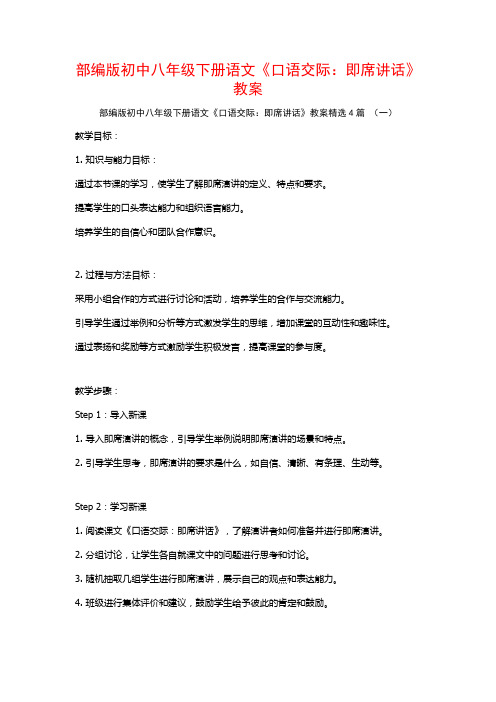
部编版初中八年级下册语文《口语交际:即席讲话》教案部编版初中八年级下册语文《口语交际:即席讲话》教案精选4篇(一)教学目标:1. 知识与能力目标:通过本节课的学习,使学生了解即席演讲的定义、特点和要求。
提高学生的口头表达能力和组织语言能力。
培养学生的自信心和团队合作意识。
2. 过程与方法目标:采用小组合作的方式进行讨论和活动,培养学生的合作与交流能力。
引导学生通过举例和分析等方式激发学生的思维,增加课堂的互动性和趣味性。
通过表扬和奖励等方式激励学生积极发言,提高课堂的参与度。
教学步骤:Step 1:导入新课1. 导入即席演讲的概念,引导学生举例说明即席演讲的场景和特点。
2. 引导学生思考,即席演讲的要求是什么,如自信、清晰、有条理、生动等。
Step 2:学习新课1. 阅读课文《口语交际:即席讲话》,了解演讲者如何准备并进行即席演讲。
2. 分组讨论,让学生各自就课文中的问题进行思考和讨论。
3. 随机抽取几组学生进行即席演讲,展示自己的观点和表达能力。
4. 班级进行集体评价和建议,鼓励学生给予彼此的肯定和鼓励。
Step 3:巩固与拓展1. 让学生分组进行即席演讲比赛,每组轮流上台表演。
2. 教师和学生共同评选最佳演讲者,并给予奖励和表扬。
3. 提醒学生在日常生活中要注意培养自己的口头表达能力,比如多参加班级演讲、班会发言等活动。
Step 4:作业布置要求学生将课堂上的即席演讲整理成小结,归纳即席演讲的要点和技巧。
教学反思:该教案通过分组讨论和实际演讲等方式,增加了学生的参与度和互动性,提高了学生的表达能力和自信心。
同时,通过比赛和评选的形式,激发了学生学习的兴趣,增强了团队合作意识。
部编版初中八年级下册语文《口语交际:即席讲话》教案精选4篇(二)以下是一种可能的《大雁归来》教案范文:教案主题:探究《大雁归来》中的情感描写教案目标:1. 了解《大雁归来》的情感描写特点2. 通过阅读和分析文本,理解文中角色的情感变化3. 培养学生运用情感描写的能力,提高写作水平教案步骤:一、导入(5分钟)1. 复习上一课的内容,引起学生对情感描写的兴趣。
部编版三年级上册《口语交际4名里的故事》语文教案
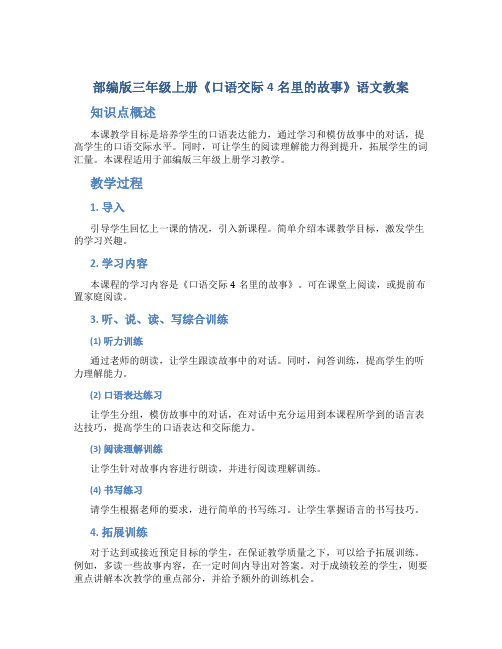
部编版三年级上册《口语交际4名里的故事》语文教案知识点概述本课教学目标是培养学生的口语表达能力,通过学习和模仿故事中的对话,提高学生的口语交际水平。
同时,可让学生的阅读理解能力得到提升,拓展学生的词汇量。
本课程适用于部编版三年级上册学习教学。
教学过程1. 导入引导学生回忆上一课的情况,引入新课程。
简单介绍本课教学目标,激发学生的学习兴趣。
2. 学习内容本课程的学习内容是《口语交际4名里的故事》。
可在课堂上阅读,或提前布置家庭阅读。
3. 听、说、读、写综合训练(1) 听力训练通过老师的朗读,让学生跟读故事中的对话。
同时,问答训练,提高学生的听力理解能力。
(2) 口语表达练习让学生分组,模仿故事中的对话,在对话中充分运用到本课程所学到的语言表达技巧,提高学生的口语表达和交际能力。
(3) 阅读理解训练让学生针对故事内容进行朗读,并进行阅读理解训练。
(4) 书写练习请学生根据老师的要求,进行简单的书写练习。
让学生掌握语言的书写技巧。
4. 拓展训练对于达到或接近预定目标的学生,在保证教学质量之下,可以给予拓展训练。
例如,多读一些故事内容,在一定时间内导出对答案。
对于成绩较差的学生,则要重点讲解本次教学的重点部分,并给予额外的训练机会。
5. 总结本次教学完成后,让学生自主回忆整个课程的内容。
然后对所学内容进行总结,巩固知识的掌握程度。
课后练习指导学生回家继续进行阅读和练习。
作业内容可以设计如下几种类型:•阅读故事,做出问题的选择题;•编写简单的短文,练习语言书写能力;•直接跟着故事,模仿里面的对话场景。
教师评价为了更好地促进学生的学习,在教学结束后,老师评价一下本次教学的情况。
针对学生在学习过程中的问题,提供相应的解决方法。
特别是对于表现好的学生,要表扬、鼓励并及时反馈其成绩,让学生在学习过程中体验到成功的喜悦,激发学生的学习兴趣。
六下--口语交际4:即兴发言教案

备课素材
一、演讲的基本要求:
1)主题明确,内容充实
演讲者往往针对现实问题,提出自己的观点,这个观点是集中的、明确的,演讲者的态度是鲜明的、坚定的,否则就不足以鼓动人、说服人。
要想感染听众,演讲的内容就要贴近听众,要充实、有新意,切忌口号连篇,说假话、空话、大话、套话。
2)感情充沛,张弛有度
要使演讲富有生命力,演讲者就要有真实感受,要想感动别人,首先要感动自己。
演讲者传达给听众的应该是真诚、热忱的感人之情。
同时,演讲者要适时的调整自己的状态,对自己感情的控制收放自如、有节有度。
3)语言丰富,仪表端庄
没有一个听众会信服一个不自信的演讲者。
自信,既是对自身的充分肯定,也是征服听众的有力武器。
演讲者不仅要表现出自信的神情,还要用自信的目光不断与听众交流。
端庄的仪表是参加公众活动所必须的,这既是对他人的一种尊重,也会使自己给他人留下良好的印象。
4)语言丰富,表达流利
演讲要在语言流畅的前提下,充分利用丰富多样的语言表述形式。
比如,用口语化的词句增强演讲的亲和力,用比喻句提高语言的生动性和形象性,用排比句增强语势,通过引用名言警句起到画龙点睛、升华主题的作用等。
口语交际教案-4
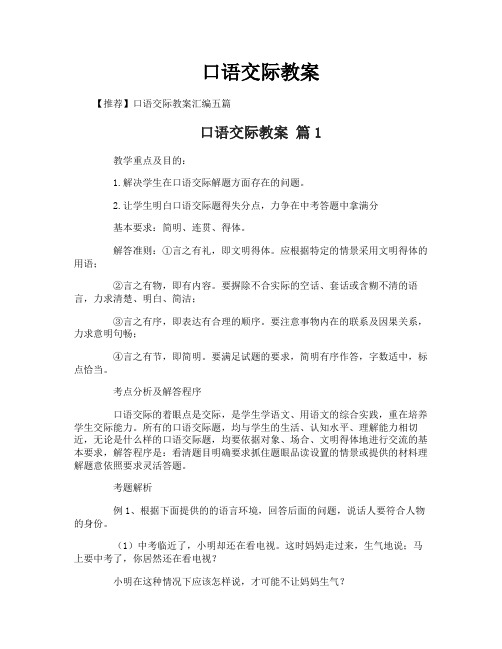
口语交际教案【推荐】口语交际教案汇编五篇口语交际教案篇1教学重点及目的:1.解决学生在口语交际解题方面存在的问题。
2.让学生明白口语交际题得失分点,力争在中考答题中拿满分基本要求:简明、连贯、得体。
解答准则:①言之有礼,即文明得体。
应根据特定的情景采用文明得体的用语;②言之有物,即有内容。
要摒除不合实际的空话、套话或含糊不清的语言,力求清楚、明白、简洁;③言之有序,即表达有合理的顺序。
要注意事物内在的联系及因果关系,力求意明句畅;④言之有节,即简明。
要满足试题的要求,简明有序作答,字数适中,标点恰当。
考点分析及解答程序口语交际的着眼点是交际,是学生学语文、用语文的综合实践,重在培养学生交际能力。
所有的口语交际题,均与学生的生活、认知水平、理解能力相切近,无论是什么样的口语交际题,均要依据对象、场合、文明得体地进行交流的基本要求,解答程序是:看清题目明确要求抓住题眼品读设置的情景或提供的材料理解题意依照要求灵活答题。
考题解析例1、根据下面提供的的语言环境,回答后面的问题,说话人要符合人物的身份。
(1)中考临近了,小明却还在看电视。
这时妈妈走过来,生气地说;马上要中考了,你居然还在看电视?小明在这种情况下应该怎样说,才可能不让妈妈生气?小明说:(2)几个不同身份的人围绕世界上最宝贵的东西是什么这一话题进行探讨,都从自己的角度去理解。
国脚说:最宝贵的东西是激动人心的进球。
商人说:最宝贵的东西是源源不断的利润。
画家说:最宝贵的东西是绚烂丰富的色彩。
对此,小孩和病人会怎么说?请你代他们回答。
小孩说:病人说:解析:本题考查根据不同场合、以不同身份说话的能力。
第(1)题,小明的语气应是商量性的,要委婉,可围绕调节休息来说;第(2)题要参考例句(做到格式一致),要充分考虑小孩天真纯洁玩的特点,以及病人对健康的珍视。
注意:不要脱离提供的特定的语言环境和人物身份。
答案:(1)参考:妈妈,你别生气,只看一会儿,让我休息休息。
部编版语文六年级(上)精品教案 口语交际4:请你支持我教案

为适应实际交流的需要,教师详细指导,既教会学生怎样设想可能会遇到的问题,又教会学生怎样应答,为实际交流做好准备。
小组内同学扮演不同的角色来练习交流,还可互换角色,把自己想到的问题提出来,提高学生口语交际中应对能力。
师:还有谁说得更礼貌一些呢?
生:老师,请问您有时间吗?我想和您说件事。
师:这样说就更容易让老师接受了。我想老师肯定会请这位同学坐下,听他来讲。接下来,这位同学要向老师说明办报的设想,他该怎么说呢?
生:我们想办一份报纸。
师:老师会怎么说?我想老师一定会问:你们怎么想到这件事?对不对?
生:对,我们就说一说。因为经常在订阅的报纸上看到好多学生们办报的消息,于是就有了这样的想法。
设计意图
导入( )分钟
一、谈话导入
1.同学们,我们经常有一些自己觉得很好的想法,但是苦于得不到别人的支持,于是很着急,很失落。你遇到过这样的情况吗?同桌相互说一说。
2.今天我们就来学习口语交际:请你支持我(板书:请你支持我)【出示课件1:出示课题】
创设学生经常遇见的场景,营造出口语交际的氛围,让学生积极主动地参与到学习中去。
课堂小结及拓展延伸
( )分钟
四、课堂总结
1.要说服别人,支持我们做一件事情,要学会正确的口语交际。态度诚恳礼貌;讲明设想,说清目的;做好预案,从容回答。
2.面对不同的人,解决不同的问题,需要注意:
先说想法,再把具体的理由讲清楚。
设想对方可能的反应,恰当应对。
板书
设计
请你支持我
说想法,讲目的
做预案,备应对
(板书:说想法,讲目的做预案,备应对)
